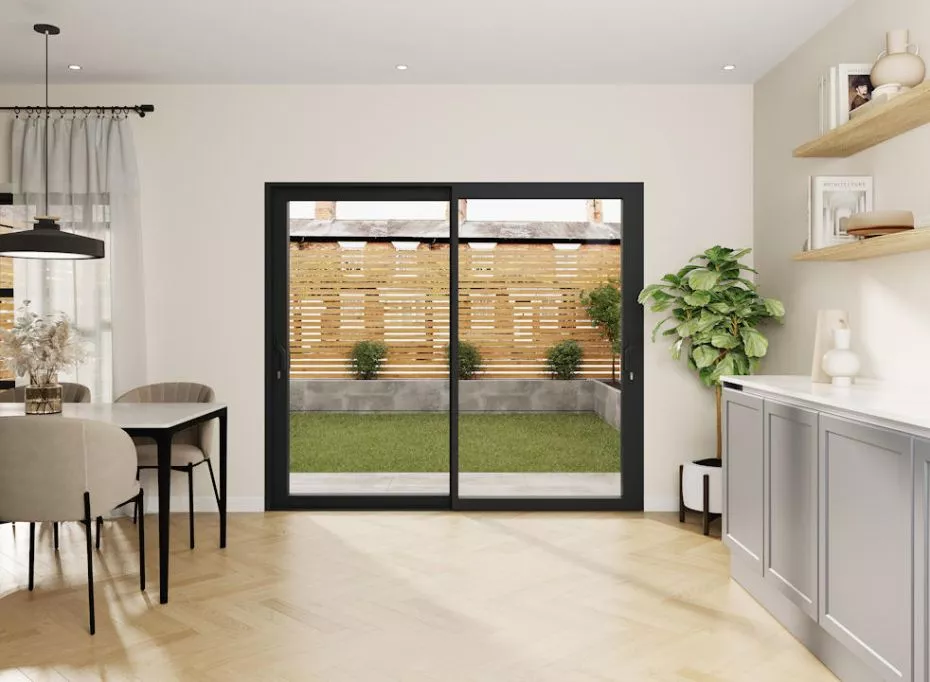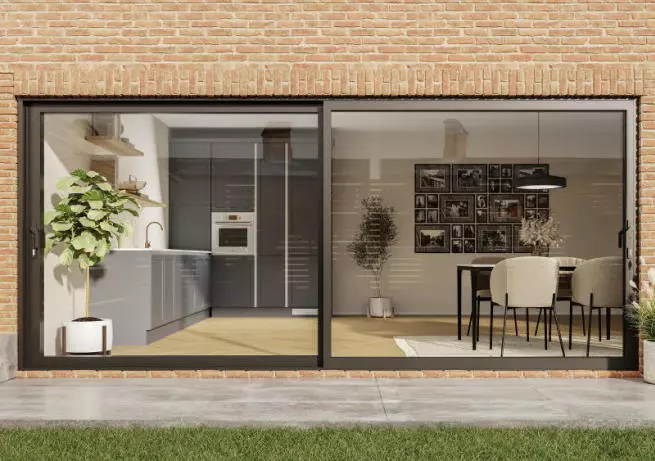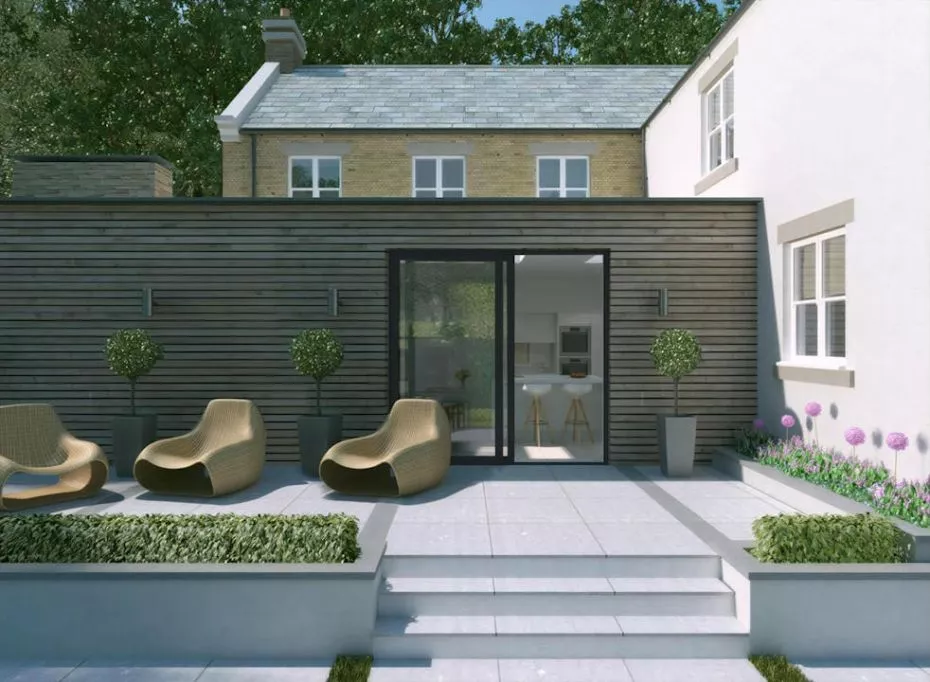Double glazing vs triple glazing for sliding doors
Sliding doors are a stylish and practical addition to any home, providing seamless access to outdoor spaces while flooding interiors with natural light. However, the type of glazing you choose for your sliding doors can significantly impact your home's comfort, energy efficiency, and noise insulation. Choosing thermally efficient sliding doors can even help to increase property value, as many homeowners consider this to be important in a property. If you are deciding between double and triple glazing, it’s essential to understand the differences, benefits, and other factors to consider.
Here, we delve into the benefits of double and triple glazing for sliding doors, comparing the overall thermal efficiency they offer, costs, and suitability for different situations.
In this guide:
Learn about the structure, benefits, and energy efficiency of double glazing.
Discover how triple glazing works and its advantages over traditional options.
Understand the performance, cost, and insulation differences between these glazing options.
Explore when triple glazing is the best choice and when it might not be necessary.
Find answers to common queries about double and triple glazing.
What is double glazing?
Double glazing has long been the standard for energy efficient windows and doors in UK homes. Its construction and functionality make it a reliable and cost-effective choice for many homeowners. Double glazing consists of two panes of glass separated by a layer of insulating gas, usually argon. This sealed unit creates a barrier that minimises heat transfer between the interior and exterior of your home.
How does double glazing work?
The insulating gas between the panes traps heat, reducing heat loss during colder months and limiting heat gain in the summer. This dual functionality ensures your home stays comfortable year-round while lowering energy consumption.
What are the benefits of double glazing?
-
Energy efficiency: Double glazing significantly reduces heat loss, helping to maintain a consistent indoor temperature and lower heating bills. The highest quality double glazed sliding doors can achieve exceptional U-Values and provide excellent thermal efficiency. For example, Vufold Status Sliding Doors offer U-Values as low as 1.4 w/m2K, and the Supreme Sliding Doors offer U-Values as low as 1.6 w/m2K.
-
Noise reduction: It provides a good level of sound insulation, making it ideal for homes in moderately noisy areas.
-
Cost-effectiveness: Double glazing offers an excellent balance of energy performance and affordability, with lower upfront costs compared to triple glazing.
Read our guide to understanding bifold door U-Values here.
Bring in more natural light with the Supreme sliding door range
Our modern Supreme aluminium sliding doors are a popular choice for many homeowners due to their sleek appearance, durability, and energy efficiency. They are made with high-quality, low maintenance aluminium frames.
These eye-catching modern external sliding door systems are supplied with low-emissivity (low-E) glass, and thermal breaks to further improve their impressive insulation and energy efficiency. Offering U-Values of only 1.6 W/m2K, you are guaranteed exceptional thermal efficiency for your home with our Supreme aluminium sliding door range.
From £2219

Shop our Supreme aluminium sliding door range today.
Key points to note
-
Double glazing is widely used in UK homes and is often sufficient for most homeowners' needs.
-
It is particularly suitable for properties in milder climates where extreme insulation isn’t a priority.
Read our full guide to understanding sliding door thermal efficiency here.
What is triple glazing?
Triple glazing takes insulation and performance a step further, making it an increasingly popular choice for energy-conscious homeowners and new builds aiming for the highest efficiency standards. Doors with triple glazing feature three panes of glass separated by two layers of insulating gas. This additional layer provides enhanced thermal and acoustic insulation compared to double glazing. Are you unsure what to look for when it comes to sliding door U-Values? Read our guide to sliding door U-Values here.
How does triple glazing work?
The extra pane and insulating gas layers create additional barriers to heat and sound transfer, further reducing energy loss and external noise. This makes triple glazing particularly effective in harsher climates and noisy environments.
The benefits of triple glazing
-
Superior thermal efficiency: Like double glazed doors, triple glazing also offers excellent U-Values, providing impressive insulation and energy savings in the long run.
-
Enhanced noise reduction: Triple glazing is more effective at blocking low-frequency sounds, making it ideal for homes near busy roads, railways, or airports.
-
Improved security: The additional pane in triple glazed doors makes breaking the glass more difficult, providing an extra layer of security for your home.
Read our complete guide to sliding door U-Values here to find out more.
Key points to note:
-
Triple glazing is ideal for properties in colder regions or areas with high noise pollution.
-
Although often more expensive than doors with double glazing, triple glazed bifold doors can often offer lower U-Values.
-
Triple glazed sliding doors are often favoured in new builds and offer increased security.

What are the key differences between double and triple glazing?
Energy efficiency
-
Double glazing: Provides excellent thermal insulation and meets UK energy efficiency standards for most homes. U-Values (which measure heat transfer) typically range from 1.2 to 1.6 W/m²K. Additionally, double glazed sliding doors are generally more affordable than triple glazed sliding doors.
-
Triple glazing: Offers superior insulation, with U-Values as low as 0.8 W/m²K. This makes it ideal for colder climates where energy savings are more substantial.
Winner: Triple glazing offers the lower U-Values, however tends to be more expensive and the benefits also depend on your property’s location and energy needs. It is also important to consider your budget when choosing the best option for you.
Noise reduction
-
Double glazing: Reduces noise effectively for most situations but may struggle with low-frequency sounds like heavy traffic or aircraft.
-
Triple glazing: Provides better soundproofing, making it a great choice for homes in noisy areas.
Winner: Triple glazing excels in noise reduction, particularly for busy or high-traffic locations.
Cost
-
Double glazing: More affordable upfront, with a quicker return on investment due to lower initial costs.
-
Triple glazing: Higher upfront costs.
Winner: Double glazing is more budget-friendly, while triple glazing is an investment for those prioritising energy efficiency and noise reduction.
Find out how sliding doors compare to bifold doors here.
Weight and frame suitability
-
Double glazing: Lighter and compatible with most sliding door frames, making it a versatile choice for retrofits and renovations.
-
Triple glazing: Heavier, requiring stronger frames, which may not be suitable for all properties or existing sliding doors.
Winner: Double glazing is generally easier to integrate into existing properties.
Find out how sliding doors compare to bifold doors here.

Is triple glazing always worth the investment?
While triple glazing offers superior performance, it’s not always the right choice for every homeowner. Here’s when triple glazing is and isn’t worth the investment for sliding doors.
When it’s worth it
-
Colder regions: If your property is in a region with harsh winters, the energy savings from triple glazing can justify the higher cost.
-
High-noise areas: For homes near busy roads, railways, or airports, triple glazing’s superior noise reduction can significantly improve indoor comfort.
-
Energy-efficient homes: You may want to invest in triple glazing if you are aiming to increase your home’s property value and are treating your sliding doors as a long-term investment.
When it’s not necessary
-
Milder climates: In areas with moderate weather, the energy savings may not offset the higher initial cost of triple glazing.
-
Budget constraints: If affordability is a priority, double glazing also offers excellent performance without the premium price tag. For example, our Status Sliding Doors offer U-Values as low as 1.4 w/m2K.
-
Frame limitations: Existing sliding door frames may not be strong enough to support the weight of triple glazing.
Key takeaway: Assess your property’s location, energy goals, and budget before deciding. For most UK homes, double glazing remains a highly effective and practical solution. Doing your research and choosing a reputable supplier, such as Vufold, ensures your doors will offer excellent performance.
Read our complete guide to sliding door thermal efficiency here.
Aluminium sliding doors from Vufold
One factor that makes Vufold sliding doors thermally efficient are the aluminium frames which feature a polyamide thermal break. This thermal break insulates the usual cold aluminium profile, thus creating a thermal bridge. Aluminium sliding doors with thermal breaks offer excellent thermal performance as well as exceptional durability. Our sliding patio doors are double glazed and are supplied with low-emissivity (low-E) glass to further improve their energy efficiency.
Our aluminium sliding doors may be a great option if you are environmentally conscious, as aluminium is a fully recyclable material, making it a sustainable option for your home. You can choose between our Supreme sliding doors and our lift and our Status lift and slide doors depending on your style and practicality preferences.
Shop our complete range of aluminium sliding doors here.
Frequently asked questions
What’s the lifespan of double and triple glazing?
Both double and triple glazing typically last 20-25 years with proper maintenance.
How do U-Values compare between the two different glazing options?
Double glazed sliding doors typically have U-Values around 1.2–1.6 W/m²K, while triple glazing can achieve U-Values as low as 0.8 W/m²K. Find out more about sliding door U-Values here.
Can triple glazing be retrofitted?
This depends on the strength and suitability of the existing sliding door frames, as heavier triple glazing may require new frames.
Does triple glazing improve security?
Yes, the additional pane makes breaking the glass more difficult, enhancing home security. Find out more about patio door security here.
Will triple glazing eliminate condensation?
Triple glazing significantly reduces condensation on the inside of the glass by providing excellent thermal insulation. However, because of the high efficiency of its insulating properties, external condensation may still occur. This happens because the outer pane remains cooler, as very little heat escapes from inside the home.
Realted Content

About John Collins
John has built Vufold into a unique online door and window company and has spent 20 years bringing innovative products and designs to fruition, recognising niches in the market and placing them in the likes of Wickes and Travis Perkins, he started Vufold in order to sell them directly. John founded Vufold and has amassed a wealth of experience in product design and development, and in particular timber-based products
Read more about John Collins

